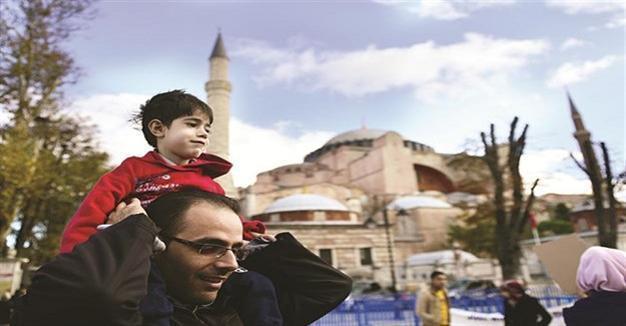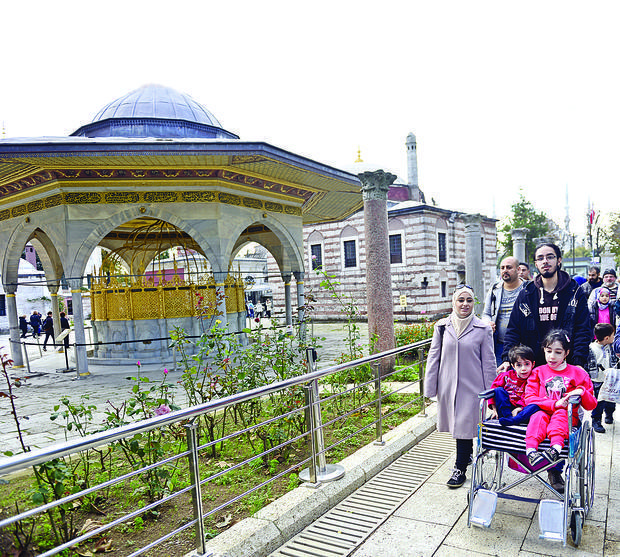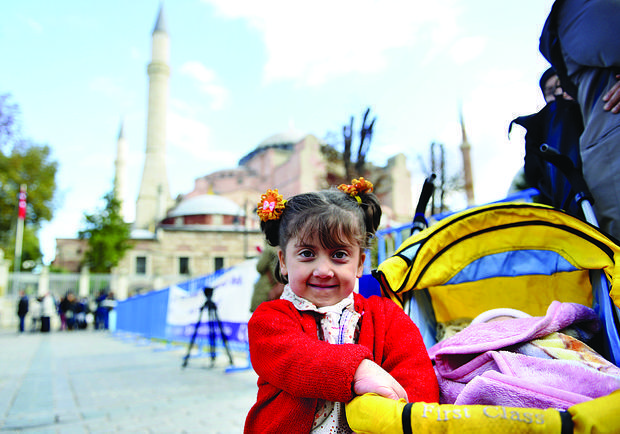A day out in Istanbul for disabled Syrian children
ISTANBUL - Anadolu Agency

AA photos
“I am so excited to see the beauties of Istanbul,” says a Syrian girl waiting impatiently to visit Hagia Sophia and the Topkapı Palace.
This is the first time she has been out to visit the historical sites of Istanbul since she arrived in the city seven months ago after escaping the Syrian conflict.
“There were many historical places in Syria too, many mosques and churches, but now everything is ruined,” 12-year-old Fatima Abdullah says.
Around 30 Syrian children aged between five and 12 had the chance to visit historical places in Istanbul on Oct. 28.
Organized by the Beyazay Association of Turkey, the trip was for Syrian children suffering from physical or psychological trauma caused by the conflict environment in their country. They were accompanied by mothers.
Fatima is one of the children. She fled from the conflict in Aleppo with her family on a broken leg. Eighteen months ago, a bomb exploded at her home leaving her unable to walk. It was then that her family decided to flee to Turkey. They have been living in Istanbul’s Okmeydanı district since they left the southern province of Kahramanmaraş for better living standards.
Fatima and her four sisters cannot receive a formal education because they do not possess the Turkish residency permit, but “by chatting with Turkish friends and going out” Fatima says she can speak decent Turkish.
“I miss my hometown a lot,” her mother says. “I am hopeful that the war will end and we will return to Syria … I come from a place where there is war, but everything here in Istanbul is great,” she said.
Four months ago in Istanbul, she had an operation on her leg. Now she can walk but cannot run.
“They are all innocent children,” says Hulut Saka, a Syrian volunteer who works to help the disabled. Having worked as the coordinator at the Syrian Nour Association, Saka now works in cooperation with the Beyazay Association.
She came to the southern province of Hatay two years ago and later left for Istanbul “to give her two sons a chance to study at university.” However, they were not able to enroll in a Turkish state university and so traveled to Germany.
For two years she has looked for a Turkish foundation to offer her services to help the disabled Syrians who, she says, need guidance on how to find treatment.
Saka also cares for a little girl whose father was killed in the conflict and whose mother found herself incapable psychologically of taking care of her daughter following her husband’s death.
She said most Syrian families in Turkey live in anxiety.
“There is food and everything at the refugee camps but they cannot go out to visit anywhere they want. And there is not enough work in the border provinces close to Syria like Hatay and Gaziantep,” Saka added.
“They want to find a job and treatment for their disabilities [in Istanbul]. They do not have enough money and they are unwell,” she said.
The Beyazay Association mainly focuses on helping the disabled and has started to collect data on disabled Syrian refugees in order to provide better care.
Syrians in Turkey cannot easily benefit from state hospital services as they lack a residency permit.
After the association determines the number of disabled people, their ages and their exact illnesses, it “supports them with treatment opportunities either through volunteer doctors or some private hospitals,” said Aylin Çiftçi, the vice president of the Beyazay Association, adding that the number of people they have taken care of so far is over 600.
According to the U.N., over 4 million Syrians have fled the country, with more displaced inside Syria. Turkey is now the world’s largest refugee-hosting country with more than 2 million Syrian refugees across different provinces, spending around $8 billion over the last five years, according to Turkish officials.


